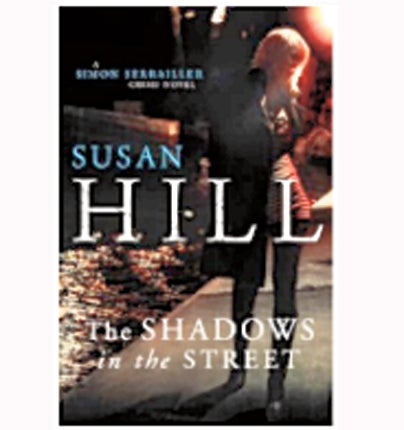The Shadows in the Street, By Susan Hill
Mystery has Victorian values

Susan Hill's detective, Simon Serrailler, has now reached his fifth mystery, a complex series of prostitute murders.
Hill's deep interest in the psychology of her characters means that she empathises with the potential victims as well as with the middle-class do-gooders who are trying to get them off the streets. Among the latter category is a lonely librarian who carries out Gladstonian activities with street walkers, taking them sandwiches. The librarian is a natural target for police suspicions, particularly those of young DS Vanek, just starting at the local nick under Serrailler.
We do not see a great deal of Serrailler, who has been staying on a remote Scottish island where he has been enjoying an uncomplicated sex life. He enters the action in order to take up the investigation of a 17-year-old girl who has been strangled and thrown into the river. Another prostitute is missing: will it be a case of murder?
The dangerous lives that these young women lead amid violent boyfriends, drug addiction and chaotic childcare are touchingly evoked as we follow them into the risky territory they must inhabit at night. And when the apparently highly respectable wife of the new Dean of the Cathedral goes missing, opinion is divided as to whether a serial killer has widened his net beyond prostitutes or whether there might be more than one murderer at work.
Serrailler's sister, the recently-widowed Cat, is a significant figure for much of the book. It is through her eyes we encounter the major players in the game, who include several members of the local clergy. One of these is married to a character with a serious psychological disturbance. Hill is notably emotionally aware of the inner turbulence of someone who is trying to care for someone with bipolar disorder, as she is about the psychology of grief. These psychological understandings are aspects familiar from her other fiction and one admires her unwillingness to be bound safely within the respected limits of the "literary" genre.
The Shadows in the Street does rather take it too much for granted that the reader is going to care about clerical arguments, and the device of having a victim who is recovering from an attack conveniently remaining unable to speak until the plot has almost run its course is a bit far-fetched. But there's still something reassuringly Victorian about Hill's literary values.
Join our commenting forum
Join thought-provoking conversations, follow other Independent readers and see their replies
Comments
Bookmark popover
Removed from bookmarks